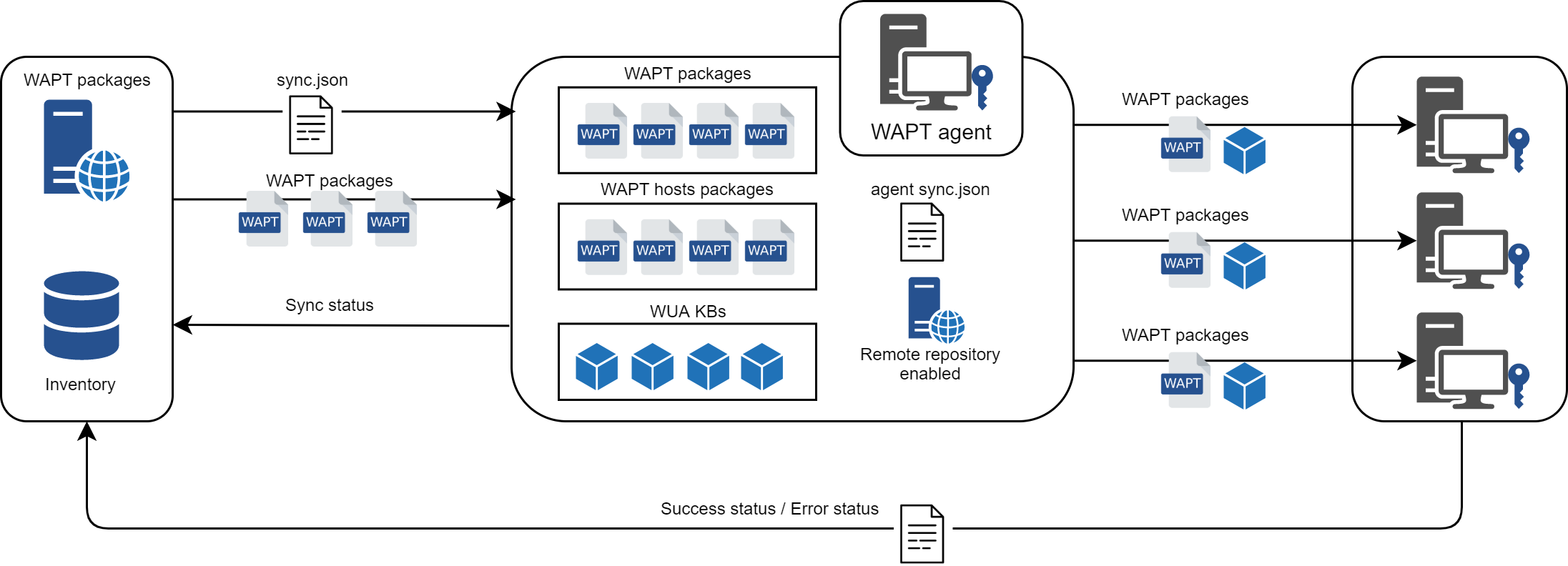Replicating a repository to preserve the bandwidth on remote sites¶
When WAPT is used on bandwidth limited remote sites, it makes sense to have a local device that will replicate the main WAPT repository to reduce the network bandwidth consumed when deploying updates on your remote devices.
With remote repositories, WAPT remains a solution with a low operating cost because you don’t have to implement high bandwidth fiber links to take advantage of WAPT.

Replicating WAPT repositories¶
It works as follows:
a small form factor and no maintenance appliance with the role of secondary repository is deployed on the local network of each remote site; a workstation can also be used, although it may not be up and running if you want to connect to it;
the remote repository replicates the packages from the main repository and other repositories;
the WAPT clients connect in priority with the repository that is the closest to them, the local repository;
Hint
The former method used to sync repositories was Syncthing and that method is available both for the Community and the Enterprise versions of WAPT.
You can find the old documentation here: (Deprecated) Replicating repositories with Syncthing.
The method explained below is for the Enterprise version only.
WAPT Agent replication role¶
New in version WAPT: 1.8 Enterprise
Starting with WAPT 1.8, repository replication can be enabled using a WAPT agent installed on an existing machine, a dedicated appliance or Virtual Machine.
The replication role is deployed through a WAPT package that enables the Nginx web server and configures scheduling, packages types, packages sync, and much more.
This feature allows WAPT agents to find dynamically their closest available WAPT repository from a list of rules stored on the WAPT server.
Replication behavior¶
Repository replication in WAPT is now handled by WAPT agents natively (Enterprise versions only).
It is based on a sync.json file which indexes every files
present in these folders:
wapt;
waptwua;
wapt-host;
Enabling replication has the following effects:
once
enable_remote_repois enabled on a WAPT agent, it will sync packages locally inside thelocal_repo_pathfolder;it adds the WAPT agent in the Repositories tab as a Remote repository, enabling new actions such as Force Sync or Check files;
by default, only the
waptfolder is synchronized, you can select which folder to sync by adding up elements inremote_repo_dirsparameters;synchronization period can be configured with
local_repo_time_for_sync_startandlocal_repo_time_for_sync_stopparameters;bandwidth allocated to sync can be configured with
local_repo_limit_bandwidth;
Every parameters of WAPT repository sync must be set
in the [repo-sync] section of the WAPT agent’s wapt-get.ini
configuration file.

Replication role behavior¶
Enabling replication on WAPT Agent¶
To enable replication on an existing agent (Linux/Windows) you need to deploy a WAPT package. It’s role is to:
install and enable the Nginx web server;
configure nginx virtualhost;
enable remote repository configuration in
wapt-get.ini;
A ready-to-use WAPT package is available in our public store to enable repository replication on Windows or Linux WAPT agents: https://store.wapt.fr/store/tis-remote-repo-conf.
WAPT Agent replication configuration¶
WAPT Agent replication configuration is set in the [repo-sync]
section in the wapt-get.ini configuration file of the WAPT agent:
Options |
Mandatory |
Example value |
Definition |
|---|---|---|---|
|
Yes |
|
Enables remote repository sync connections. |
|
Yes |
|
Set local packages root repository path |
|
No |
|
Set sync start time (HH:MM / 24h format) |
|
No |
|
Set sync stop time (HH:MM / 24h format) |
|
No |
|
Set sync period (minutes) |
|
No |
|
Set sync allowed bandwidth (Mbits/s) |
|
No |
|
Set synced folders (default: wapt,waptwua) |
Below is an example of wapt-get.ini:
[global]
...
use_repo_rules = True
[repo-sync]
enable_remote_repo = True
local_repo_path = D:\WAPT\
local_repo_time_for_sync_start = 20:30
local_repo_time_for_sync_end = 05:30
local_repo_sync_task_period = 25
local_repo_limit_bandwidth = 4
remote_repo_dirs = wapt,waptwua,wapt-host
WAPT Server replication configuration¶
The WAPT Server needs to be aware of repositories to sync in the [options]
section of its waptserver.ini located in /opt/wapt/conf/
Options |
Example value |
Definition |
|---|---|---|
|
True |
Enables remote repository sync server side (sync.json) |
Then we must restart both waptserver and wapttask:
systemctl restart waptserver wapttask
Repository rules¶
Repository rules behavior¶
By enabling repository rules support, the WAPT agents will automatically
retrieve their rules.json file from the WAPT server.
The rules.json file is a signed .JSON file
that contains a list of sorted rules to apply to the WAPT agent,
so to redirect its downloads from the most appropriate repository.
If no rules can be matched, WAPT agent fallbacks onto the repo_url settings
of the WAPT server wapt-get.ini configuration file.

Repository rules behavior¶
Enabling repository rules¶
Repository rules are configured in WAPT Console.
Rules can be based on several parameters:
Options |
Example value |
Definition |
|---|---|---|
Domain name |
|
Rule based on Active Directory domain name |
Domain sites and services |
|
Rule based on Active Directory Sites and Services |
Agent IP |
|
Rule based on Agent IP sub-network |
Public IP |
|
Rule based on Public IP (NATed hosts) |
Hostname |
|
Rule based on hostname |
Adding a rule in the WAPT Console¶
In Repositories, click on the Add rule button. The following window appears:
- ..figure:: create_new_rule.png
:align:center
You can then choose from the different above parameters and affect values to a specific secondary WAPT repository. The option will prevent from falling back to the main WAPT server and will avoid potential network congestion.
The rules are applied from top to bottom, and the first rule that matches the conditions overrides all the other rules below.
Using repository rules on WAPT agents¶
Warning
If you have configured GeoIP redirects on Nginx, you should disable it as it might conflicts with repository rules.
To enable WAPT Agent repository rules, you must enable this setting in the [global]
section of wapt-get.ini configuration of the WAPT agent:
Options |
Mandatory |
Example value |
Definition |
|---|---|---|---|
|
No |
|
Enables repository rules usage |
Below is an example of wapt-get.ini:
[global]
...
use_repo_rules = True